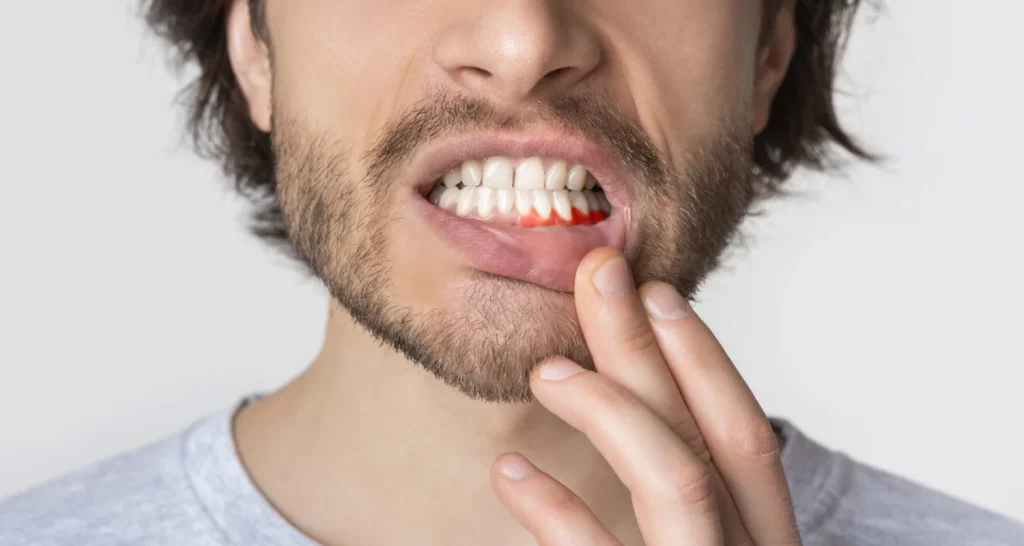Last Updated on: 4th December 2024, 05:09 pm
Generally, when talking about oral health, we mention the prevention of tooth decay; however, it is also very important to pay attention to the gums since they support the teeth and keep the roots and nerves protected. We want to prevent the causes of itchy gums by maintaining good oral hygiene. Sometimes, we are not attentive to symptoms indicating that something is not right, such as inflammation, bleeding, and itching. They are the typical signs of gum disease. There are many causes. We will first discuss the sensation of itchy gums and how to treat it.
Itchy gums cause discomfort. It is a warning sign of oral health conditions that need to be addressed. The itching sensation can occur along with inflammation and pain in the gums. The gums are the soft tissue that supports the teeth and protects their internal part from infections and different pathologies that can affect them, which is why it is important to receive the required dental care when this type of alert occurs.
What are the causes of itchy gums?

Different situations can cause itching, such as poor dental hygiene, allergies to certain foods or medications, or periodontal disease. Here is a brief tour of the different underlying circumstances that can trigger itchy gums:
-
- Accumulation of bacterial plaque.- Plaque is a sticky layer that houses bacteria. It forms on the surface of the teeth and under the gums; over time, Plaque builds up and hardens. The tartar is a hard layer that requires the intervention of a dentist or hygienist to remove it.
The presence of bacterial plaque causes sensitivity, itching, bad breath, and inflammation of the gums, a condition that can lead to gum disease. - Whitening at home.Understanding how teeth whitening works is essential to avoid gum irritation caused by improper use of hydrogen peroxide for at-home teeth whitening. To safely and effectively carry out this home practice, it is necessary to prepare a mixture of peroxide with water in the proper proportions. It is crucial to consult information about the potential drawbacks this chemical may have on oral health. Additionally, it is highly recommended to consult a dentist before applying any teeth whitening methods.
- Hormonal changes. An increase in hormones is frequent at puberty, with the use of contraceptive methods, and in pregnancy, a situation that increases blood flow in the gums, causing inflammation, sensitivity, and possible itching.
- Gingivitis / periodontal disease.Gingivitis is an inflammation of the gums, the consequence of the accumulation of bacterial plaque. The immune reaction to inflammation of the gums causes itching. This is an asymptomatic disease that evolves; the symptoms become evident with inflammation, such as halitosis, dark red gums, receding gums, and bleeding when brushing or flossing.
- Aggressive oral hygiene. Brushing your teeth with too much pressure or with a brush with very hard bristles can irritate and injure the gums, facilitating an infection. A similar situation can occur with the use of dental floss. To maintain healthy gums and prevent such issues, it is essential to learn how to floss properly.
- Gum injuries. This type of common trauma can cause pain and itching. These injuries can be the result of an accident, bruxism, periodontal disease, vaping, or smoking. Wounds in the gums facilitate the access of bacteria to the internal structures of the teeth and jaw.
- Allergic reactions and sensitivity of the gums. Gum allergies are reactions of the immune system due to the consumption of food, medicines, and products used for oral hygiene and pets.
Symptoms of gum allergies can include itching, redness, swelling, and mouth sores.
Gum sensitivity is an exaggerated response of the gum tissue to stimuli such as brushing, flossing, eating food, as well as hot or cold drinks. This sensitivity can manifest pain, inflammation, and bleeding gums. - Xerostomia. The decreased level of saliva causes dry mouth (dry mouth). This is the effect of eating some foods and can also be a symptom of various diseases.
Viscous saliva, difficulty speaking or swallowing food, bad breath, and dry lips, and tongue are signs of xerostomia. If dry mouth is not controlled, the PH of the saliva increases allowing the growth of bacteria and increasing the possibility of dental caries.
- Accumulation of bacterial plaque.- Plaque is a sticky layer that houses bacteria. It forms on the surface of the teeth and under the gums; over time, Plaque builds up and hardens. The tartar is a hard layer that requires the intervention of a dentist or hygienist to remove it.
What is the treatment for itchy gums?

There are several therapeutic options to manage this health condition. Some are related to regular oral hygiene habits and food consumption. Others require the intervention of a dentist:
-
- Brush the teeth a minimum twice a day and use dental floss, without falling into excess force or pressure.
- Consumption of ice cubes helps reduce itching and stimulates saliva production.
- Use a mouth rinse with a mixture of water and salt.
- Avoid or reduce tobacco use.
- If the itching is the result of an allergy, it can be controlled with antihistamine medications.
- Consume a balanced diet rich in vitamin C and calcium, as well as drink water after eating food.
Other alternatives are dental interventions such as:
-
- Plate scraping: The dentist applies this therapeutic practice to remove tartar and calculus.
- Root planing. A specialized procedure is done after scraping the plaque when there is too much tartar. Smoothing prevents more plaque from adhering to the teeth.
- Laser cleaning: This process removes plaque and tartar. In addition, it can be a complement to traditional scaling and smoothing.
Can itching and irritation of the gums be prevented?
If it is possible to prevent this oral health condition, with some regular habits:
-
- Avoid eating foods high in sugar or acid.
- Practice good oral hygiene daily
- Reduce or avoid tobacco use.
- Consume a balanced diet.
- Visit the dentist regularly.
People who have been diagnosed with diabetes or another pathology that compromises the immune system should be more careful with oral hygiene.



Heed the signal. Don’t ignore it.
Itchy or scratchy gums are a symptom of a dental condition that requires attention to maintain good oral health.
If itching occurs, it is recommended to consult a dentist since the health of the gums may be compromised and the state of the teeth at risk.
The dentist will make the corresponding assessment to establish the diagnosis and indicate the required treatment, as well as the management to control the discomfort caused by itching.
In addition, the continuous sensation of itching can lead to scratching the gums, which can cause lesions in the gingival tissue and increase the risk of infections.
Frequently Asked Questions
Insufficient intake of vitamin C, for example, can lead to inflamed, swollen, and itchy gums. This condition, known as scurvy, can result in tooth loss and various health problems. By maintaining a well-balanced diet that includes fruits and vegetables, you can prevent scurvy and other vitamin deficiencies.
The buildup of plaque along the gumline can create an itchy sensation in the gums, which can also be perceived as itchiness in the teeth. Gum disease can increase tooth sensitivity, potentially leading to an itchy feeling.
Moreover, an excess of mucus, often associated with chronic sinus issues or a common cold, can stimulate plaque production. If not promptly addressed and treated, plaque buildup can progress to gingivitis, the initial stage of gum disease. Itchiness is a common symptom during this phase.
Sometimes, when you injure your gums, undergo a tooth extraction (such as wisdom teeth surgery), or develop a gum sore, itchiness may occur as part of the healing process. This is a natural aspect of the healing journey, and it is advisable to avoid scratching the area as it may reopen the wound.
Contact us
If you have any questions about this or other topics, you can contact us at Channel Island Family Dental as well as our Facebook page. We look forward to your visit and we will make a timely diagnosis. Our dentists in Oxnard, Saint Paula, Venture, Newbury Park, and Port Hueneme will be able to guide you toward the best treatment to take care of your health and give you back your best smile.
Bibliography
- Zimlich, R. BSN; Piracha, K. MD. Common Causes and Treatment for Itchy Gums. Verywellhealth (Internet). Published on July 19, 2022; consulted on: Sep 22, 2022. Available from: https://www.verywellhealth.com/itchy-gums-5223667
- Parker, H., Baby, D. Gum Problem Basics: Sore, Swollen, and Bleeding Gums. WebMD (Internet). Published on April 22, 2022; consulted on: Sep 22, 2022. Available from: https://www.webmd.com/oral-health/guide/gum-problem-basics-sore-swollen-and-bleeding-gums
- Holland, K.; Marcin, J. Itchy Gums. Healthline (Internet). Published on Aug 23, 2017; consulted on: Sep 22, 2022. Available from: https://www.healthline.com/health/dental-and-oral-health/itchy-gums
- Sissons, C.; Frank, C. What’s to know about itchy gums? MedicalNewsToday (Internet). Published on Sep 29, 2017; consulted on: Sep 22, 2022. Available from: https://www.medicalnewstoday.com/articles/319565#outlook



